We are listening: Sahiyo’s statement on protests against police brutality
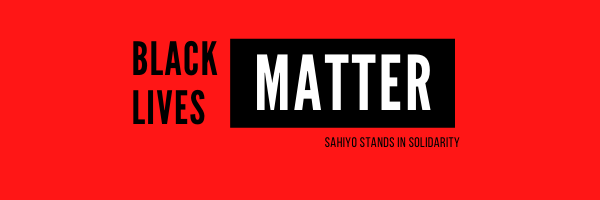
We at Sahiyo wanted to purposefully create space to address the continued protests against police brutality in the United States and globally, and explicitly state that we stand in solidarity with the protesters fighting for black lives. Many are coming forward to condemn the treatment of people of color. But we need to be clear in stating that it is black lives that we are focusing on right now. The U.S. has been built on and fueled by white supremacy and the active oppression of black people, enforced by the prison industrial system, the police and other agencies. As an organization working with South Asian communities, we recognize that colorism and anti-blackness exists within our communities, as well. We have benefited from the model minority stereotype, but we must make a choice now – we can choose to buy into the model minority trope, and align ourselves with whiteness. Or we can address the colorism and anti-blackness in our own community, and step forward as allies to stand beside this country’s black communities. The events of the past two weeks are happening at a time in which black Americans are getting consistently hit hardest by COVID-19, due to the structural inequality of the country, and the resulting high populations working in essential positions without access to proper healthcare, and a well-documented bias in the medical profession. These are incredibly disturbing times and it can be difficult figuring out the best ways to support and take action. Educate yourself, go to a protest, speak up when you hear anti-blackness around you. Speak up without centering yourself or performing allyship for social capital. Take care of yourself and the people around you. Of course, not everyone has the capacity to physically protest, especially during these already challenging pandemic times and the need to practice social-distancing to stay safe and healthy. There are a multitude of ways to still take action and show your support for racial equality and justice. Donate to campaigns and organizations working to create structural change: George Floyd Memorial Fund Black Visions Collective Reclaim the Block Campaign Zero National bail funds Watch in order to educate yourself on these issues: 13th Eyes On The Prize documentary series The Black Panthers: Vanguard of the Revolution Long Night’s Journey Into Day When They See Us Read and share information with friends and family: Articles: How To Be An Ally in Fighting Racial Injustice APF Honors Black History Month https://www.topospartnership.com/library/ The 1619 Project – The New York Times The Secret History of South Asian and African American Solidarity Books: The Fire Next Time by James Baldwin Biased by Jennifer Eberhardt How to be an Anti-Racist by Ibram X. Kendi Between The World and Me by Ta-Nehisi Coates The New Jim Crow by Michelle Alexander White Fragility by Robin DiAngelo Black Skin, White Masks by Frantz Fanon To Kill a Mockingbird by Harper Lee Long Walk to Freedom by Nelson Mandela Talking Back: Thinking Feminist, Thinking Black by bell hooks Ain’t I a Woman: Black Women and Feminism by bell hooks Listen: About Race Code Switch (NPR) Seeing White Intersectionality Matters (Hosted by Kimberle Crenshaw) These are only a handful of ways one can take action, but as a global community, we must do so, and we must ensure that all black lives matter. At Sahiyo, we are listening and we are here for the black community and all allies supporting change. With love, solidarity and hope, ~ The Sahiyo Team
Supporting each other through COVID-19 and continuing our efforts to end female genital cutting

Dear Sahiyo community, We’re writing to let you know that we are so grateful to have you be part of the Sahiyo community, and even though we are living in unprecedented times with the COVID-19 pandemic and our everyday lives look different right now, we’re committed to helping you stay connected to us and our mission to support survivors and protect future generations of girls from female genital mutilation/cutting (FGM/C) in meaningful ways. Around the globe, the Sahiyo team was already working remotely, however, we have cancelled all of our in-person events for the months of March, April, and May and are taking the necessary steps to ensure that we can provide virtual options for community members and survivors affected by FGC who need our support where possible. Here are a few ideas on how you can continue to connect with us: Write for our blog Volunteer remotely Connect with us on social media Tell us your virtual advocacy ideas by writing to info@sahiyo.com Donate to us Bottom line, reach out. We may have to socially distance from each other in person for awhile, but we can connect and further our advocacy work to support survivors and protect future generations of girls from FGC in other ways. We will not let girls, women and communities impacted by FGC get left behind. Sahiyo continues to partner, share and advocate globally for an end to the practice. We hope that through adversity, positivity will win through, and we can learn new, innovative ways of working as we come through this crisis together. Sending love, solidarity, and gratitude to you and your loved ones, ~ Sahiyo
Sahiyo Staff Spotlight: Tania Parks

Tania Parks works as Grants Coordinator at Sahiyo and is passionate about gender justice issues. She has held various roles at a domestic violence survivor advocacy non-profit in San Francisco called W.O.M.A.N., Inc., and was the Gender-Based Violence Research Intern at a women’s health non-profit based in Paris called Women and Health Alliance, International. She holds a Masters in Human Rights and Humanitarian Action from The Paris Institute of Political Studies with concentrations in Middle East Studies and Migration Studies. 1) When and how did you first get involved with Sahiyo? I first got involved with Sahiyo after I learned that a Voices to End FGM/C community education event had taken place close to where I live. I contacted co-founder Mariya Taher, a former colleague, to congratulate her on hosting such an amazing event and I really wanted to get involved, so I offered to assist in any way that I could. 2) What does your work with Sahiyo involve? I mostly offer development support in the form of drafting grant proposals, maintaining project budgets, and sometimes helping with communications projects. 3) How has your involvement with Sahiyo impacted your life? Before working with Sahiyo, I had very little knowledge of female genital cutting (FGC). I have come to understand that FGC is a very complex and widespread issue, but despite this, it is often shrouded in silence. I have also learned that sharing personal stories of trauma and resilience has a powerful effect on listeners and is capable of inciting lasting social change. 4) What words of wisdom would you like to share with others who may be interested in supporting Sahiyo and the movement against FGC? If you’re thinking about getting involved with the movement to end FGC, don’t hesitate! It is an urgent issue and more advocates are needed to spread awareness. Be sure to practice self care, as it can be emotionally charged work, and contact us to get involved!
Sahiyo’s New Video Campaign: No More Female Genital Cutting -Volunteers Share Their Stories
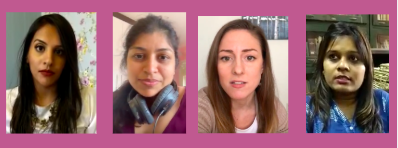
As April is known as Sexual Assault Awareness month, as well as a National Child Abuse Prevention Month and Female Genital Cutting (FGC) is an issue which lies at the pivotal intersections between these two issues, Sahiyo has begun a campaign to highlight why the Sahiyo community is working to both support survivors of FGC as well as to work towards preventing FGC form occurring to future generations of girls. Sahiyo reached out to our community of volunteers- spanning the globe, from Bahrain to Boston, and asked them to share their thoughts on their activism to end FGC, and why this issue matters to them. Throughout the month, short videos made by our Sahiyo community will be shared via social media. These voices belong to our volunteers, staff, advisory board and storytellers, each of whom has a different history and experience or knowledge of FGC – from beginning volunteers to more experienced advocates Do help us share this tapestry of powerful voices that are part of the ‘No More FGC- Volunteers Share Their Stories’ campaign by sharing these videos with your own networks. Find them on Sahiyo’s Youtube or Facebook today!
Sahiyo Staff Spotlight: Lara Kingstone
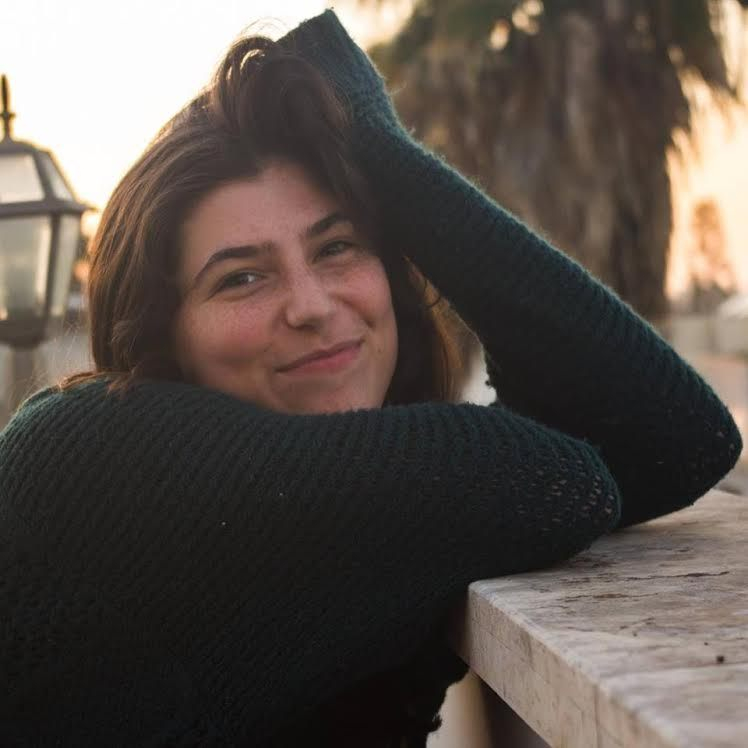
Lara Kingstone started her career in community organizing in a UK-based program designed to integrate London communities and empower youth to become active and engaged citizens. Lara earned a BA in Political Communications at IDC Herzliya, an Israeli University, while working as a journalist at The Culture Trip and producing and hosting a human rights radio program. She then worked at an educational center which aimed to help Palestinian and Israeli young people learn English together, and get to know each other as peers and partners in peace. After graduating, she moved to the Thai-Lao border where she volunteered at Child Rights and Protection Center, a small non-profit which aims to prevent human trafficking and gender-based violence, while providing a safe and confidence-building living environment for at-risk young women. Lara then moved to Boston, and interned with Big Sister before starting her part-time role at Silver Lining Mentoring as an Outreach Coordinator, where she aims to find volunteers to become long-term mentors for youth in foster care. She joined Sahiyo in August 2018. When and how did you first get involved with Sahiyo? In August 2018, I applied for the role of Communications Assistant, thrilled to see that an organization that so closely aligned with my interests was hiring. I have a background in non-profit work, and working to ensure dignity and human rights for women globally. I’d been interested in Female Genital Cutting, and the work to end the practice for years, doing a thesis paper on it in college, and had actually heard of Sahiyo a few years prior, whilst learning about global efforts to end FGC. What is the nature of your work at Sahiyo? I’m now the Communications Coordinator. The work is constantly different, which I enjoy. It varies from working on grant applications and event reports, to supervising our lovely social media interns, to providing administrative assistance to the team. And anything else that pops up! How has your involvement in this work impacted your life? Joining Sahiyo has been incredible. I’ve been hit with a rush of motivation and energy, because I feel intensely passionate about the work and organization. I find myself truly inspired by our global team, and all the partners we connect with. I’m confident in the leadership as they have experience and knowledge of the community and practice we’re focusing on. I trust this team of brave, resilient and hard-working women, and I’m so honored to be able to support the work in any way I can. From day one it’s been intense and challenging, and I find myself constantly learning and growing with it. It’s very exciting being with such a fast-growing organization like Sahiyo, and getting to see the rapid changes and progress the team makes. I’m a big fan, and hope to be onboard for a long time. Is there any advice you would like to share with others interested in joining or supporting Sahiyo’s work? Do it! Sahiyo has so many different opportunities for being involved, even offering anonymous ‘Private Activism’ for those who are more comfortable in that capacity. If you have skills to bring to the table and feel passionately about Sahiyo’s goal, joining is definitely a worthwhile move, that will leave you feeling connected, empowered and proud to be part of this whirlwind movement.
Sahiyo and Khatna survivors get attacked online through ‘organized trolling’

In the recent years Sahiyo has come across many dissenting views while engaging with followers on the internet on the topic of ending Female Genital Cutting. The dissenting views have come in the form of tweets, comments, emails, people personally dissuading us from our work, and more. And every time someone has tried to tell us that Female Genital Cutting is beneficial for the woman, we have tried to present a reasoned argument against it. It is our mission to create a counter-narrative on Female Genital Cutting in the communities practicing it, through dialogue and education. That said, we recently observed a phenomenon of ‘organized trolling’, a spate of attacks online. A few days ago, Sahiyo’s Facebook page was attacked with negative reviews from different people. It happened in a quick span of a few minutes and oddly enough every review had almost the same things to say. The trolls gave Sahiyo one-star ratings and called us a ‘sham organization’. In some reviews, co-founders were named individually and discredited for bringing shame to the community. Furthermore, these reviews stated that Sahiyo co-founders are creating a fake narrative against Female Genital Cutting prevalent in the community for their personal gains. This kind of behaviour qualifies as online harassment, because it is an intentional attempt to attack and discredit a group and its individual members in manner that is not civil. In 2015, Sahiyo conducted an anonymous survey with 385 respondents out of which 81% people responded that they didn’t want the practice to continue. Since its inception, the number of people supporting Sahiyo’s mission has increased manifold, as men and women from the community have come out against the practice. Yet there is a significant number of people who fear openly coming out with their views against the practice. Online harassment through organised trolling is one among the many reason why people fear voicing their opinions publicly. Through Sahiyo, we want to create a safe space where opinions on the practice could be heard and tolerated, not trolled and shunned. By attacking online and publicly shaming, the pro-khatna supporters have displayed their intolerance against any view that counters or challenges the practice. FGC is illegal in many parts of the world including United States and Australia, where people from the Bohra community have faced legal action for practising Female Genital Cutting. Furthermore, the jamaats (congregations) in US, UK and Australia came up with notices asking members not to practice FGC because it is against the law of land. Yet pro-khatna supporters continue to defend the practice, and in doing so, some of them resort to trolling or online harassment through foul language and personal attacks of those why they disagree with. While claiming that they have personally not had negative experiences with FGC, they attack, discredit and dismiss the personal experiences of others who have had negative experiences with FGC and have taken the courage to share their stories. While we disagree with pro-khatna rhetoric which has been passed down since generations within the community, we — and the FGC survivors who share their stories with us — want to create room to have a dialogue and debate around it without being personally attacked. Many women who have undergone FGC already have a challenging time talking about their experience openly. There is a fear and shame associated with sharing their stories — shame that it happened to them and perhaps feelings of not wanting to be viewed as victims. There is also a very real fear of backlash and of not being believed, and online trolling validates these fears. Trolling makes it more difficult and dangerous for people to come forward, and for community members to feel supported because of something they feel. Furthermore, it is only a clear exhibition of intolerance prevalent in the community, which quells voices of the people who don’t agree with their mandate. Sahiyo strongly condemns online trolling of those who have voiced their views against the practice. Online harassment or trolling leaves no room for debate or dialogue.
Break the Silence on FGC Soumou in New York
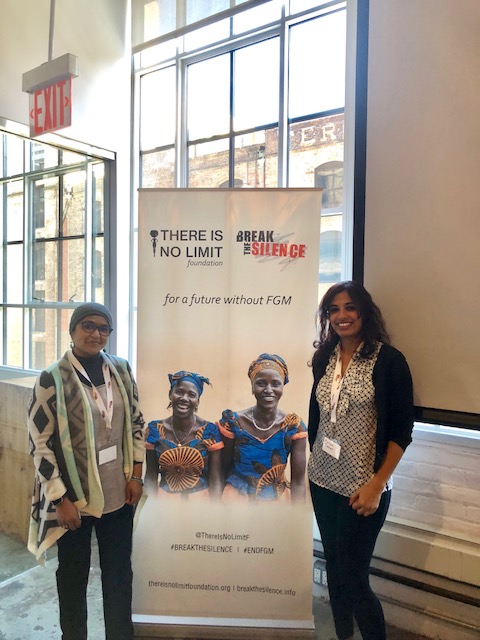
From March 24-25th, Sahiyo Cofounder, Mariya Taher, spoke on Fireside Conversation – Seeing is Believing: Story Telling and Media Engagement to end FGM,” during the Break the Silence Soumou in New York City organized by There is No Limit Foundation. The event was held in commemoration of Women History Month and the United Nations 62nd Commission on the Status of Women (CSW62). A “Soumou” is a Malinke word for “gathering.” Traditionally, the Soumou is an opportunity for building unity, creating a collective goal, and remembering the past through storytelling. It is also a moment to dream about the future and to learn lessons that will lead to realizing the dream. This was the goal of Break The Silence Soumou. The weekend included workshops, strategy sessions, and cross-sectional movement building aimed at ending FGC in the U.S..and at unifying grassroots organizations, as well as, survivors, and allies in the movement to end FGC.
Shifting terrains: Lessons learnt from the first U.S. Activists Retreat for Bohras against Female Genital Cutting
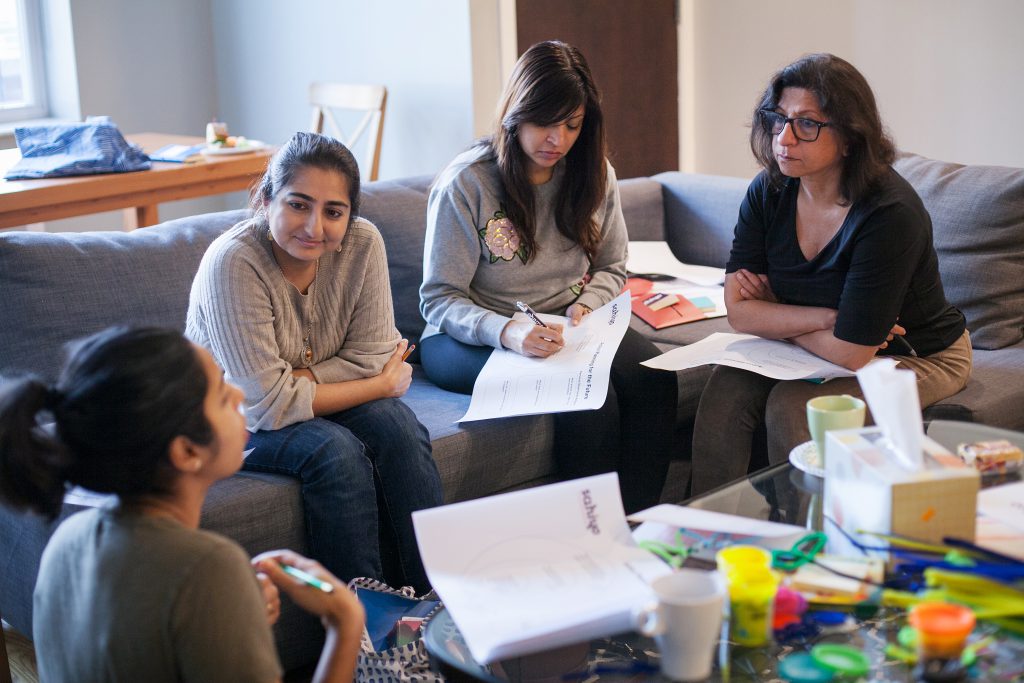
(This post was originally published on the blog of Georgetown University’s Berkley Center for Religion, Peace, and World Affairs, the Berkley Forum) By Mariya Taher, MSW, MFA In this day and age when social media has penetrated our lives, 24-hour news cycles shape our worldviews, and there is never enough time to process the influx of information coming at you, it’s often difficult to remember that social change is slow, hard work, much like pushing a heavy rock up a steep hill. With the #MeToo movement heavy on people’s minds, it’s easy to feel that change is imminent, that no longer will women cower in fear from the sexual harassment and violence generation after generation has experienced due to their genders. Yet, as someone who has dedicated the past ten years of her life towards ending gender violence of all kinds, unfortunately, the real hard truth is that social change does take time, and the seeds of that social change must be planted in the generations proceeding ours before they can even become fruit for future generations of girls and women. That message was one I hoped to convey to the ten women who accepted my invitation to gather in New York on January 19th through January 21st for what my organization Sahiyo called a “U.S. Dawoodi Bohra Anti-Female Genital Cutting Activists Retreat.” The women who came together, like me, had all been born into the Dawoodi Bohra Religion and Culture. Also, like me, these women felt encouraged to take an active role in preventing FGC or “Khatna” as it is known in the Dawoodi Bohra community, from occurring on girls of the next generation. I and my fellow Sahiyo cofounders have been planning this retreat for the past year. (Sahiyo will also host an Activist Retreat in India in mid-February 2018). We planned both these retreats because we had recognized from our own experience, that being an activist is emotionally and physically challenging, and often “we” did this work in isolation from one another. As activists, the challenges we face are often linked to the fact that FGC in our community developed due to a consistent repetition of the practice generation after generation. This caused it to become a deeply entrenched ritual many followed without question because that’s just the way it is. To challenge this norm, meant to challenge the wisdom of those who came before us, and in a sense admit that our religious traditions are fallible. Activists who do challenge FGC, often encounter the wrath of those who would simply let live a practice that has always been done. At the U.S. Activists Retreat, many of us spoke about the negatives that come with challenging your family and friends on the issue of FGC, as well as challenging other social norms an individual may no longer want to partake in. Some women at the U.S. Retreat spoke about the economic boycott their husbands’ businesses encountered, others spoke about friends who no longer spoke to them or about how they feared losing friendship (or support systems they have had since childhood) if they openly discussed FGC. Another woman told us about how she had to call the police on her own brother who harassed her for her activism against FGC and for voicing an opinion that contradicted the edict given by the Dawoodi Bohra religious leaders. In Greek mythology, Sisyphus was destined to consistently push a rock up a hill, only to have it roll back down repeatedly. Like Sisyphus, anti-FGC Activists can consistently be in a position where the rock rolls back down despite our valiant efforts to end FGC, particularly because we are struggling against deeply rooted frames about gender and religion, and the terrain is consistently tilted against us. When you believe you are the only one pushing that rock back up that hill, it can also be lonely. Often the emotional and physical needs of activists are overlooked, as are the struggles they or their families go through so that social change can happen. Prior to meeting the other women who would be the cofounders of Sahiyo with me, I spoke about FGC individually, and independently. I wrote my own story of undergoing it for Global Fund for Women. It was through writing my story that I connected to the additional women who would be my allies. Years later, I have recognized just how much I needed those women to not only validate the fact that my own feelings around Khatna were justified, but to also share in the emotional hardships that come with being one of a few voices who publicly speak against FGC. Connecting with the women who would become the other Sahiyo Co-founders had essentially broken the sense of isolation I didn’t even realize I was experiencing in walking the public life of an activist against FGC. [youtube url=”https://youtu.be/r3U5uv3keEQ”] We imagined it might be the same for other activists speaking out against FGC. The U.S and India Retreats, we believed, could be a space where activists could come together to share both the challenges and opportunities they have found in advocating against FGC. It could be a place where activists could gather, share their pain, their fears, and feel less alone in the advocacy work they pursue. The retreats could also be a safe space where as a team we could formulate action steps on how we could move forward in addressing FGC in our communities. For the U.S. Activists Retreat, as so much attention has been brought onto the topic of FGC since the arrest of Dr. Jumana Nagarwala, a Dawoodi Bohra woman who is accused of performing FGC on girls in Michigan, that discussing these next steps felt crucial. The Activists Retreat was the first of its kind in the United States for women who came from the Dawoodi Bohra culture and religion, and it was a step in the right direction in terms of activists recognizing that to truly ensure that FGC is abandoned by the majority
Sahiyo participates in 2017 Hilton Humanitarian Foundation Symposium
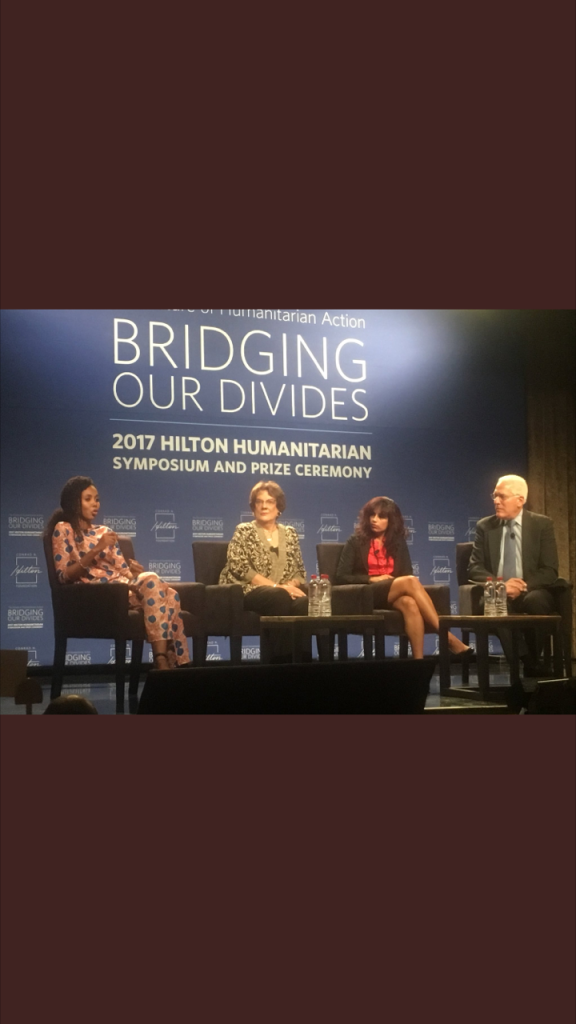
On October 11th, Mariya was invited to take part in the 2017 Hilton Humanitarian Foundation Symposium. Mariya, along with Tostan’s founder Molly Melching, and Safe Hands for Girl’s’ Jaha Dukureh, was on a panel titled “Empowering the Silent to Speak, Engaging Communities to Respond”, to discuss FGC and the work being done to end it. To watch a recap of the event, click here. This year’s 2017 Hilton Humanitarian Prize was presented to icddr,b. To learn more about award recipient, click here.
Working Together To Address FGC: Michigan Roundtable

On October 9th, Sahiyo, along with Equality Now, Tahirih Justice Center, and forma came together in a roundtable discussion with Michigan’s Department of Health and Human Services (DHHS) to engage in cross-discipline dialogue on the challenges and best practices regarding how to respond to FGC in the United States. The roundtable discussion helped attendees to increase their knowledge base on FGC, understand the medical circumstances associated with FGC, and identify strengths, gaps, and policy/law implications that could improve outcomes for children and families. Sahiyo’s Mariya helped to facilitate this initial roundtable, and continues to work with DHHS on next steps to ensure that we work to address the issue of FGC, and how to support survivors, in a holistic manner.
